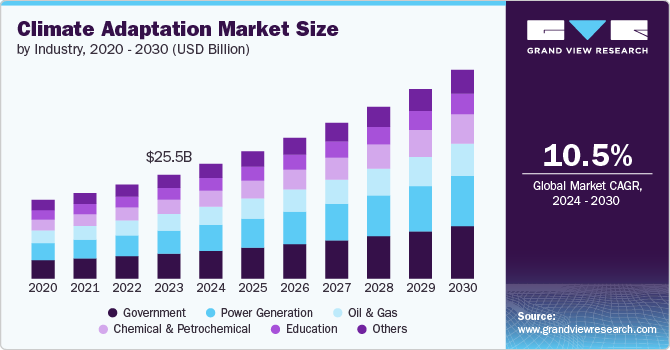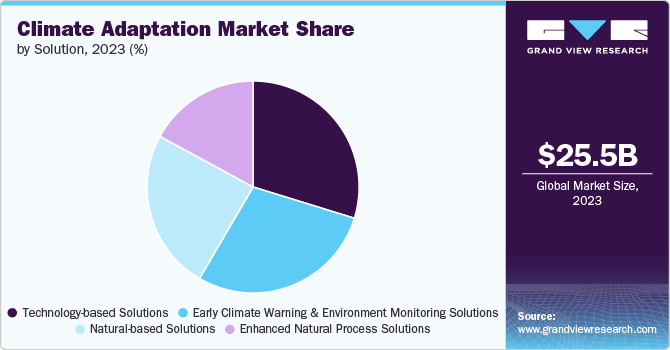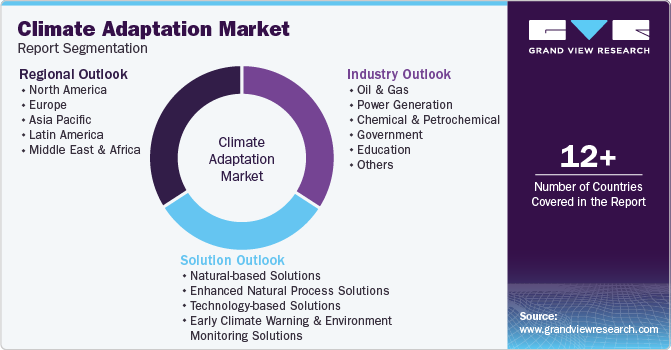- Home
- »
- Next Generation Technologies
- »
-
Climate Adaptation Market Size, Share & Trends Report 2030GVR Report cover
![Climate Adaptation Market Size, Share & Trends Report]()
Climate Adaptation Market (2024 - 2030) Size, Share & Trends Analysis Report By Solution (Natural-based Solutions, Technology-based Solutions, Early Climate Warning & Environment Monitoring Solutions), By Industry, By Region, And Segment Forecasts
- Report ID: GVR-4-68040-431-0
- Number of Report Pages: 100
- Format: PDF
- Historical Range: 2017 - 2022
- Forecast Period: 2024 - 2030
- Industry: Technology
- Report Summary
- Table of Contents
- Segmentation
- Methodology
- Download FREE Sample
-
Download Sample Report
Climate Adaptation Market Summary
The global climate adaptation market size was estimated at USD 25.45 billion in 2023 and is projected to reach USD 51.24 billion by 2030, growing at a CAGR of 10.5% from 2024 to 2030. The increase in extreme weather events, such as floods and droughts, is pushing governments and businesses to invest in climate resilience.
Key Market Trends & Insights
- Asia Pacific accounted for a significant market share of over 43.0% in 2023.
- The climate adaptation market in the U.S. is expected to grow significantly over the forecast period.
- By solution, the technology-based solutions segment led the market and accounted for over 29.0% of the global revenue in 2023.
- By industry, the government segment accounted for the largest market revenue share in 2023.
Market Size & Forecast
- 2023 Market Size: USD 25.45 Billion
- 2030 Projected Market Size: USD 51.24 Billion
- CAGR (2024-2030): 10.5%
- Asia Pacific: Largest market in 2023
Governments are implementing policies and funding projects for infrastructure and early warning systems, while corporations are focusing on adaptive technologies and sustainability initiatives. Advancements in climate forecasting, water management, and energy-efficient infrastructure are further driving the effectiveness of these adaptation efforts.

Urbanization is driving the need for resilient infrastructure that can withstand climate impacts, including climate-resilient buildings and transportation systems. Insurance companies are increasingly promoting adaptive measures to mitigate climate-related damages, offering incentives to those who invest in resilience. International agreements such as the Paris Agreement are fostering global collaboration in implementing adaptation strategies alongside mitigation efforts. In agriculture, climate adaptation technologies such as drought-resistant crops and smart farming are essential for ensuring food security.
Corporate Social Responsibility (CSR) and Environmental, Social, and Governance (ESG) commitments are leading companies to integrate climate adaptation into their strategies to reduce risks and improve resilience. Innovation in renewable energy, including wind and solar, is helping reduce reliance on vulnerable energy sources while enhancing energy security. Community-based initiatives are empowering local efforts to address climate challenges with tailored solutions. The insurance and financial sectors, along with these developments, are driving investment in climate adaptation.
Solution Insights
The technology-based solutions segment led the market and accounted for over 29.0% of the global revenue in 2023. These solutions leverage advanced technologies such as artificial intelligence, machine learning, sensors, and big data analytics to predict climate risks, enhance infrastructure resilience, and optimize resource management. The growing demand for accurate climate modeling and risk assessment tools, especially in industries such as energy, transportation, and agriculture, has driven adoption. Additionally, the increasing emphasis on sustainable urban development and the integration of smart technologies into climate-resilient infrastructure contributed to the segment's growth.

The early climate warning & environment monitoring solutions segment is experiencing significant growth in the climate adaptation market due to the rising need for proactive measures to mitigate climate-related risks. As extreme weather events become more frequent and intense, governments, businesses, and communities are investing in systems that provide early warnings and real-time environmental monitoring. These solutions help enhance preparedness and reduce damage by allowing timely interventions. Additionally, advancements in satellite technology, IoT sensors, and predictive analytics have improved the accuracy and effectiveness of these systems, further driving demand in sectors such as agriculture, disaster management, and urban planning.
Industry Insights
The government segment accounted for the largest market revenue share in 2023 due to its central role in climate resilience and disaster preparedness. Governments are responsible for large-scale infrastructure projects, policy development, and public safety initiatives, all of which require substantial investments in climate adaptation solutions. Moreover, the demand for climate adaptation solutions is being driven by the need to safeguard critical infrastructure, minimize vulnerabilities to extreme weather events, and fulfill international climate commitments. Governments are also increasingly funding early climate warning systems, environmental monitoring programs, and nature-based solutions to safeguard both urban and rural areas.
The power generation segment is expected to grow significantly in the climate adaptation market due to the increasing focus on transitioning to renewable energy sources and building climate-resilient infrastructure. As the effects of climate change intensify, energy generation and distribution systems are becoming more vulnerable to extreme weather events. This has driven investments in technologies that enhance resilience, such as weather-resistant infrastructure, advanced grid management systems, and diversified energy sources like wind, solar, and hydro. The shift toward renewables is also playing a key role in ensuring long-term sustainability and reliability in energy production, further accelerating growth in this segment.
Regional Insights
Asia Pacific accounted for a significant market share of over 43.0% in 2023 due to the region's high vulnerability to climate change impacts, such as severe weather events, flooding, and rising sea levels. Rapid urbanization and economic growth have strengthened the need for resilient infrastructure and adaptive solutions. Additionally, governments and organizations in the region are investing heavily in climate adaptation projects to safeguard communities and economic assets.
North America Climate Adaptation Market Trends
The climate adaptation market in North America is gaining significant traction due to increasing investment in infrastructure resilience and advanced technologies to combat climate change impacts. The region is facing more frequent and severe weather events, prompting governments and businesses to enhance their adaptive measures. Additionally, there is a strong focus on integrating climate resilience into urban planning, energy systems, and disaster management strategies.
U.S. Climate Adaptation Market Trends
The climate adaptation market in the U.S. is expected to grow significantly over the forecast period due to increasing awareness and urgency around climate change impacts, such as extreme weather events and rising sea levels. Investments in infrastructure upgrades to enhance resilience, including flood defenses and advanced early warning systems, are driving market growth. Federal and state-level initiatives and funding programs are further supporting these efforts, incentivizing both public and private sectors to adopt adaptive solutions. Additionally, the integration of climate resilience into economic and environmental policies is contributing to the market's expansion.
Europe Climate Adaptation Market Trends
The Europe climate adaptation market is poised for significant growth driven by region's strong regulatory framework and ambitious climate goals drive substantial investments in climate adaptation solutions. European countries are also prioritizing infrastructure resilience and implementing advanced technologies to address the impacts of climate change. Additionally, the region's focus on sustainable development and the integration of climate adaptation into policy and planning contribute to the region's growth.
Key Climate Adaptation Company Insights
Key players in the industry have strengthened their market presence through a strategic mix of product launches, expansions, mergers and acquisitions, contracts, partnerships, and collaborations. These initiatives serve as vital tools for enhancing market penetration and strengthening their competitive edge within the industry. For instance, in December 2023, the ENACT Partnership expanded to include France, the U.S., Belgium, the Netherlands, Switzerland, Pakistan, and the UN Environment Programme. This global initiative focuses on addressing climate change, land degradation, and biodiversity loss through nature-based solutions. ENACT aims to protect 1 billion vulnerable people, secure 2.4 billion hectares of healthy ecosystems, and boost global efforts in mitigating climate change by preserving carbon-rich ecosystems.
Key Climate Adaptation Companies:
The following are the leading companies in the climate adaptation market. These companies collectively hold the largest market share and dictate industry trends.
- BARANI DESIGN Technologies s. r. o.
- Campbell Scientific, Inc.
- Carbon Engineering ULC
- Climeworks
- CAPA Strategies, LLC.
- DTN
- Esri
- Global Thermostat
- IBM Corporation
- ClimeCo LLC
Recent Developments
-
In July 2024, ClimeCo LLC launched NatureLink, a new tool to help organizations find Nature-based Solution (NBS) projects. NatureLink simplifies the NBS marketplace by using an online questionnaire to match organizations with suitable projects based on their preferences, including project type, geographic location, carbon credit use, and financial metrics. It provides a curated list of validated global NBS options.
-
In July 2024, Forecastro, a climate tech startup, launched WeatherWise, a patent-pending Automatic Weather Station (AWS) that uses IoT, AI, and Machine Learning to provide precise weather data. Made in India, WeatherWise measures UV radiation and humidity and offers climate change predictions and advanced early warning systems to help monitor and mitigate climate change impacts.
-
In February 2024, the Global Environment Facility (GEF) approved USD 203 million to support climate adaptation projects in least-developed countries, small island developing states, and other vulnerable nations. The funds will go towards 21 projects focused on enhancing food systems, water resources, and climate warning systems, aiming to address urgent adaptation needs, support local communities, and strengthen environmental policies.
Climate Adaptation Market Report Scope
Report Attribute
Details
Market size value in 2024
USD 28.17 billion
Revenue forecast in 2030
USD 51.24 billion
Growth rate
CAGR of 10.5% from 2024 to 2030
Base year for estimation
2023
Historical data
2017 - 2022
Forecast period
2024 - 2030
Quantitative units
Revenue in USD million/billion and CAGR from 2024 to 2030
Report coverage
Revenue forecast, company ranking, competitive landscape, growth factors, and trends
Segments covered Application
Solution, industry, region
Regional scope
North America; Europe; Asia Pacific; Latin America; MEA
Country scope
U.S.; Canada; Mexico; UK; Germany; France; China; Japan; India; Australia; South Korea; Brazil; UAE; KSA; South Africa
Key companies profiled
BARANI DESIGN Technologies s. r. o.; Campbell Scientific, Inc.; Carbon Engineering ULC; Climeworks; CAPA Strategies, LLC.; DTN; Esri; Global Thermostat; IBM Corporation; ClimeCo LLC
Customization scope
Free report customization (equivalent up to 8 analysts working days) with purchase. Addition or alteration to country, regional & segment scope.
Pricing and purchase options
Avail customized purchase options to meet your exact research needs. Explore purchase options
Global Climate Adaptation Market Report Segmentation
This report forecasts revenue growth at global, regional, and country levels and provides an analysis of the latest industry trends in each of the sub-segments from 2017 to 2030. For this study, Grand View Research has segmented the global climate adaptation market report based on solution, industry, and region:

-
Solution Outlook (Revenue, USD Billion, 2017 - 2030)
-
Natural-based Solutions
-
Afforestation & Reforestation
-
Coastal & Marine Habitat Restoration
-
-
Enhanced Natural Process Solutions
-
Land Management
-
Enhanced Weathering
-
Ocean Fertilization
-
-
Technology-based Solutions
-
Bioenergy with Carbon Capture & Storage (BECCS)
-
Direct Air Capture & Carbon Storage (DACCS)
-
Carbon Capture & Storage (CCS)
-
-
Early Climate Warning & Environment Monitoring Solutions
-
-
Industry Outlook (Revenue, USD Billion, 2017 - 2030)
-
Oil & Gas
-
Power Generation
-
Chemical & Petrochemical
-
Government
-
Education
-
Others
-
-
Regional Outlook (Revenue, USD Billion, 2017 - 2030)
-
North America
-
U.S.
-
Canada
-
Mexico
-
-
Europe
-
UK
-
Germany
-
France
-
-
Asia Pacific
-
China
-
India
-
Japan
-
Australia
-
South Korea
-
-
Latin America
-
Brazil
-
-
MEA
-
UAE
-
South Africa
-
KSA
-
-
Frequently Asked Questions About This Report
b. The global climate adaptation market size was estimated at USD 25.45 billion in 2023 and is expected to reach USD 28.17 billion in 2024.
b. The global climate adaptation market is expected to grow at a compound annual growth rate of 10.5% from 2024 to 2030 to reach USD 51.24 billion by 2030.
b. North America dominated the climate adaptation market with a share of 20.9% in 2023. The climate adaptation market in North America is gaining significant traction due to increasing investment in infrastructure resilience and advanced technologies to combat climate change impacts. The region is facing more frequent and severe weather events, prompting governments and businesses to enhance their adaptive measures.
b. Some key players operating in the climate adaptation market include BARANI DESIGN Technologies s. r. o.; Campbell Scientific, Inc.; Carbon Engineering ULC; Climeworks; CAPA Strategies, LLC.; DTN; Esri; Global Thermostat; IBM Corporation; and ClimeCo LLC.
b. The increase in extreme weather events, such as floods and droughts, is pushing governments and businesses to invest in climate resilience. Governments are implementing policies and funding projects for infrastructure and early warning systems, while corporations are focusing on adaptive technologies and sustainability initiatives.
Share this report with your colleague or friend.
Need a Tailored Report?
Customize this report to your needs — add regions, segments, or data points, with 20% free customization.

ISO 9001:2015 & 27001:2022 Certified
We are GDPR and CCPA compliant! Your transaction & personal information is safe and secure. For more details, please read our privacy policy.
Trusted market insights - try a free sample
See how our reports are structured and why industry leaders rely on Grand View Research. Get a free sample or ask us to tailor this report to your needs.










